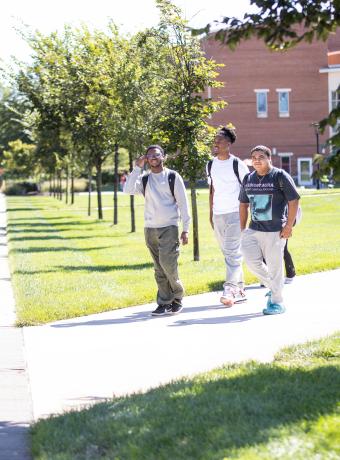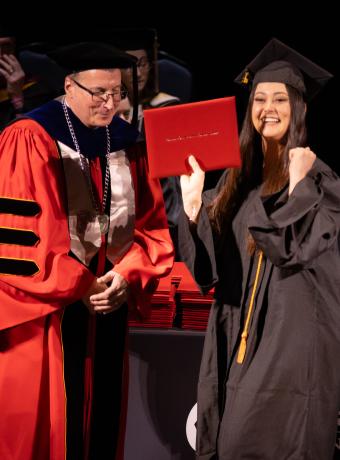
If you’ve been walking or driving around the Rowan College at Burlington County campus these past few months, you may have noticed some colorful new additions hanging from the light poles. In March, new tri-fold banners were installed as part of a grant highlighting students studying to enter nontraditional roles.
With bold colors and a “Be In Demand” slogan, these banners raise awareness of career and technical education jobs and represent students who were not deterred from pursuing a job because of outdated gender expectations. They prove that anyone can get started in the field of their choice at RCBC.
The banners feature students in careers such as cybersecurity, nursing, engineering, construction management, and addictions counseling. We talked to two of the student models, our own RCBC Barons, who graciously donated their time for this campaign, and asked them about their firsthand experiences as students in a nontraditional role. Joseph Macauley-Coker, an addictions counseling major, and Angelyah Sveum, a cybersecurity major, had this to say.
What’s it like seeing your face around campus?
SVEUM: As I was driving on campus, I happened to see the picture of me on the light pole, and I was genuinely surprised. I hadn’t expected that at all at this time. It’s a wonderful experience seeing yourself being presented by the college you study at. I enjoy RCBC’s method of posters and advertisements, as it consists of actual people and real experiences.
Why did you choose RCBC?
MACAULEY-COKER: I chose RCBC because I was looking for a place that didn’t just offer a solid education but also felt like a community. I wanted a school where I wasn’t just a number and where my personal journey — especially as a returning, nontraditional student — would be understood and supported.
SVEUM: I chose RCBC because of the variety of programs and opportunities it offers students without breaking the bank. My current studies and career are fully attributed to RCBC, as they have a wonderful cybersecurity program.
What’s your favorite part about attending RCBC?
MACAULEY-COKER: What I love most about RCBC is the people. The professors here are knowledgeable, incredibly compassionate, and invested in your success. There’s a real sense of care, which you don’t find everywhere. The support system — from faculty to fellow students — has made all the difference for me.
SVEUM: The way they had various events to bring students together, such as Drag Bingo and Bob Ross painting sessions, brought a lot of communities together that you would never expect to interact with. Regardless of your major, you can still find something in common with other students here.
What made you choose your major?
SVEUM: I wanted to be a fashion designer initially, but found myself to be fascinated with computers and their components to a significant degree. What really solidified specialization in cybersecurity was the coursework and hands-on approaches that our professor, Paul Warner, took. With the cyber labs, your assignments are what you would see in the field, allowing you to adapt and feel more comfortable in the work environment.
MACAULEY-COKER: I decided to study addictions counseling because I’ve seen firsthand the toll that addiction can take on individuals and families. I’ve also seen how powerful the right support can be in someone’s recovery. I want to be that support, to help people rebuild, find hope again, and remind them that they’re never too far gone to change their story.
What’s your favorite or most rewarding part of your major?
MACAULEY-COKER: The most rewarding part is knowing I’m learning the skills to truly make a difference in someone’s life. Every time I learn something new in class that I can imagine applying in the real world, it reinforces my purpose. It’s not just about a degree — it’s about building a future where I can be there for others during some of their most vulnerable moments.
SVEUM: I believe the most rewarding aspect of cybersecurity is helping others understand how to keep devices safe and secure, which allows them to become more comfortable with it. I find that a lot of people are intimidated (initially myself as well) by the various layers of cybersecurity, but as long as you monitor your devices, use different passwords, and use a multi-factor authenticator (such as sending a code/PIN to a device as an extra safeguard) you are already securing your device and doing your own cybersecurity!
You’re considered nontraditional in your major. Do you face any struggles with this? If so, how do you combat it?
SVEUM: Since it is a very technical field, you can have a lot of people questioning your skillset, warranted and/or unwarranted. There are times when you can see people’s skepticism on their faces before you even begin to show your expertise that transcends the cybersecurity field. With this, don’t be afraid to be honest about where you are in your specialty, as it’ll change their mind about you entirely by showing them your extensive knowledge or leveling with them on what you know.
MACAULEY-COKER: As a man in addictions counseling, I do sometimes feel like I stand out, but I don’t see that as a bad thing. If anything, it motivates me more. I’ve learned to lean into that uniqueness and use it as a way to connect with others, especially those who may feel hesitant to open up. At the end of the day, compassion, empathy, and understanding don’t have a gender. And if I can help break some of those stereotypes along the way, even better.
For more information on career and technical education, visit rcbc.edu/cte.






